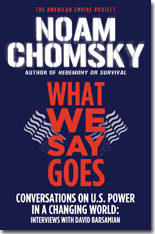
What We Say Goes
Noam Chomsky
223 pages including index
published in 2007
Noam Chomsky has been one of the most consistent critics of American hegemony and empire of the past four decades, maintaining a prodigious rate of output over the years as one of the few socalled public intellectuals who does not see his role as parroting received wisdom. His books, articles and interviews have always managed to explain in clear, understandable language how America and its ruling class keeps its power both domestically and abroad and particularly how it dictactes the boundaries of acceptable discourse. A measure of his importance as a critic of American power can be found in the vehemence of the criticism aimed at him by both conservative and liberal commentators. Despite their differences, both groups believe in American exceptionalism, the idea that America has a right, or even a duty to shape the rest of the world according to its own desires. What Chomsky has done for so long has been to show the reality behind "defending democracy" and "humanitarian intervention" and neither liberals nor conservatives like this.
What We Say Goes is his latest book, a collection of interviews he gave to David Barsamian about "U.S. power in a changing world". It's fair to say that there are few surprises here for those who've read his previous books, with the interview format used here precluding muhc indepth analysis. However, if you look at this book as an introduction to Chomsky and his concerns, What We Say Goes works fine. It's short and to the point and as per usual Chomsky manages to cut to the heart of things quickly. He talks about all his usual obsessions -- the way in which democracy and human rights are used against official enemies, the role of the US in the Middle East and South America, the role of the socalled free press in determining the boundaries of criticism allowed -- and ties them together, with the interview format helping in keeping things rolling along.
As such, it's a good primer for anybody who has noticed all the misery caused by US foreign policy in the last eight years and who wants to know more about. Unlike a lot of other outrage books about the unprecedented crimes of the Bush regime, Chomsky is not afraid to show that no, what Bush has been doing in the Middle East and elsewhere is nothing new. He constantly draws connections between current policies and previous imperial adventures. What's more, he doesn't let the Democrats off the hook for their part in these adventures either.
The book starts off with a discussion of the 2006 War on Lebanon, in which Chomsky picks holes in the official story of America as disinterested and honest negotiator between the parties, when, as careful readers of my other weblog know, it was supplying Israel at the time. Instead he suggests that the Israeli attack, though it was opportunistic, was supported in Washington as a way to get rid of one obstacle to a war with Iran: the possibility of Hezbollah revenge attacks on Israel. No Lebanon, no Hezbollah, no deterrent. In the end Israel did not succeed, but did manage to cripple Lebanon's infrastructure, again with US (and UK) support in the UN.
But the US doesn't have it all its own way, as the next chapter, looking at the revolutions taking place in South America, make clear. Ever since the failed 2002 coup in Venezuela leftwing governments have sprung up all over the continent and they're increasingly opposed to America and its interests. Again, Chomsky goes into the history behind these events to explain why these are so important and why the American press deliberately misrepresents them to fit the worldview in which the media operates.
This is also part of the more generalised discussion behind the examples Chomsky and Barisiman talk about, like the threatening war with Iran, the role Israel plays in policing rhe Middle East and the influence the socalled Israel lobby has on US politics, that the media systematically misrepresents events and the role America plays in them because they operate from an officially mandated consensus reality. The news media follow the lead of Washington and frame debate accordingly, with even the most liberal point of view operating from certain core assumptions, the most important of which are that America is a force for good in the world and that official sources can be the baseline against which to measure others.
But Chomsky also argues that this consensus reality is much less pervasive than in the early sixties when he started his analysis, that there are much more and better alternate sources of news than there were then and that it has become harder to shape public reality this way. He also argues that America need not be an egoistical superpower telling the world that "what we say goes", but could be reshaped into something much more true to its supposed ideals by some simple unoriginal measures that could change the country significantly, if enough people felt that this should happen and organise themselves accordingly. It's this awareness he says he's trying to inject into people with his books, articles and other work.
Read more about:
Noam Chomsky,
What We Say Goes,
United States,
politics,
book review